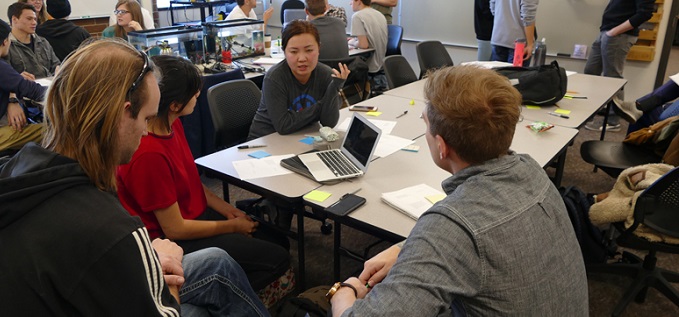Fostering a culture for STEM entrepreneurs
By Ellie Ashford
June 6, 2018
For a Colorado college, a National Science Foundation annual community college STEM competition aligns perfectly with what it is doing around STEM innovation and entrepreneurship.
The National Science Foundation’s Community College Innovation Challenge is a big deal for Red Rocks Community College (RRCC) in Colorado.
An RRCC team was the first place winner in 2015 — the first year of the challenge — placed in the top 10 in 2016, second in 2017 and has high hopes for the 2018 challenge.
The Innovation Challenge calls for teams of three to five students to use science, technology, engineering and mathematics (STEM) – and entrepreneurial thinking – to develop innovative solutions to real-world problems. The top 10 teams are invited to participate in a four-day Innovation Boot Camp, after which the winners are selected.
The American Association of Community Colleges is a co-sponsor of the competition. “The students competing in this challenge are leaders in innovation,” says AACC President Walter Bumphus. “Their use of STEM solutions to benefit society are not only highly significant but necessary in helping to secure a strong future.”
Innovative projects
Red Rocks submitted 13 projects to the 2018 challenge. The project accepted by the NSF as a finalist is a “knee-assisting exoskeleton” consisting of a biomechanical engineering design for a new kind of brace to help patients recovering from an ACL tear, a type of knee injury.
The students’ invention reduces weight on the knee joint, allowing patients to stay mobile during the eight-week recovery period. It was developed with assistance and mentoring from specialists at Next Level Physical Therapy, the team’s industry partner, and biomechanical engineering professionals.
Liz Cox, director of RRCC’s IDEA Institute and the team’s faculty adviser, is bringing the students to the NSF boot camp in Alexandria, Virginia, June 11-14, where they will join finalists from other community colleges to participate in workshops, show their prototypes before a panel of judges and present their ideas at poster session reception in Washington, D.C.
In the workshops, students will learn how to communicate about and market their idea, think entrepreneurially and evaluate their project’s marketing potential.
“There’s lots of nervous energy in the lab,” as students are putting the finishing touches on their project and completing a video about it,” Cox says.
The students on the team are all in their 20s; three intend to continue their studies in engineering, and two plan to pursue higher degrees in applied math.
Real-world learning
“When the NSF launched the first challenge in 2015, it was in perfect alignment with what we were doing around STEM and innovations,” Cox says.
RRCC President Michele Haney had launched the IDEA Institute to support innovation and entrepreneurship by advancing initiatives in STEM fields and project-based learning. In 2014, the college received an NSF grant to improve STEM education by creating a project-based engineering design course where students work in teams on real-world projects.
“So when the challenge grant program started, we already had a class working on that,” Cox says.
Meanwhile, RRCC developed a center for innovation known as RISE to help faculty integrate real-world projects into their courses; had its Cyber Defense Center designated a National Center of Academic Excellence in Cyber Defense by the National Security Agency and Department of Homeland Security; and opened an Idea Lab, a maker space and hub for innovation where students in different disciplines can work together.
Those initiatives have brought more engineering and science students to Red Rocks, Cox says.
The IDEA institute runs engineering and design classes for students interested in applying for the NSF challenge. “They think about problems to work on and develop STEM solutions,” she notes.
All members of the previous RRCC teams that competed in the Innovation Challenge have transferred and are working on four-year degrees, while some are also employed in STEM fields, Cox says.
There’s more to the story! Read the full article in CC Daily.


